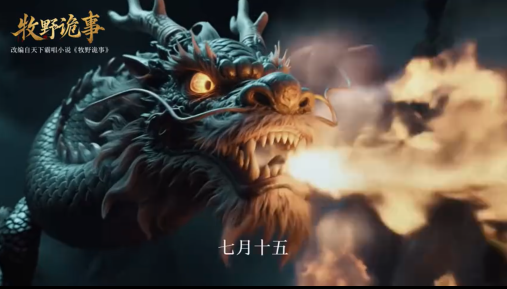AI-generated short films gaining popularity in China
The term “AI-generated short films” has recently exploded across social media ever since a highly publicized trailer for Mysteries of the Wild Frontier — billed as entirely AI-produced and adapted from the blockbuster novel “Candle in the Tomb”— teased its imminent release.
This 40-second preview plunges viewers into a chilling underground palace bathed in flickering candlelight, scored by spine-tingling music. Enhanced by state-of-the-art AI engines, the scene heightens suspense to cinematic extremes.

Screenshot from the trailer for AI-generated short film "Mysteries of the Wild Frontier."
Reactions have been split: some netizens gushed, “This tech is mind-blowing,” while others scoffed, “It feels so fake; best to treat it like an animated series.”
Praise or skepticism aside, the buzz highlights a growing mainstream fascination with AI-driven storytelling. Industry watchers note that since late 2024, experiments in AI short films have surged, thanks to video-generation models like Sora, Jimeng, and KLing AI.
February 2025 marked another milestone: Mysteries in Khingan Mountains became China’s first paid AI short film, launching the sector’s commercial era. Platforms quickly followed suit, dangling perks such as traffic subsidies and revenue-sharing schemes to stoke competition.
Independent creators are jumping on the trend, too. Take “LT Puppy Diary,” a pet-themed AI short series that amassed over 100,000 followers on RedNote within weeks.
Major players — Douyin, Kuaishou, and Baidu — have poured capital and infrastructure into AI short films. Experts predict a full-blown AI short-film breakout by late 2025. DataEye Research estimates China’s micro-short-film market topped 50.4 billion yuan ($6.8 billion) in 2024 and is projected to hit 1 trillion yuan by 2027.
So far, AI productions have gravitated toward fantasy, sci-fi, and supernatural genres, leveraging the tech’s knack for conjuring epic battle scenes and surreal worlds while masking occasional visual glitches. “AI really shines in these three genres,” says Chen Kun, director of the AI short Mountain and Sea Chronicles: Breaking the Waves.
Compared with traditional shoots, AI slashes both time and cost. According to Beijing Daily, an industry insider revealed that "AI can cut a 45-day production down to 10 days, trimming expenses to just 20% of a live-action budget."
Yet critics warn of rising content fatigue. Conversations with over a dozen viewers pointed to familiar pitfalls: repetitive tropes, jarring scene cuts, and uncanny character distortions.
Still, producers remain optimistic. Chen Xiangyu, founder of Outliers and director of the AI short New World Loading, argues that generative AI tools are evolving at lightning speed. "Collaborative AI models will empower creative teams to push imaginative boundaries," he says.
Long-term success, however, hinges on balance, cautions Pan Helin, a member of the Ministry of Industry and Information Technology’s Expert Committee for Information and Communication Economy. “AI should amplify human creativity, not replace it. For AI short films to truly flourish, they must tackle fresh themes and raise production quality,” she warns.
Other hurdles remain, such as unresolved copyright disputes.
As the sector accelerates, its ultimate test will be demonstrating that AI can work hand in hand with artistry — not erase it.